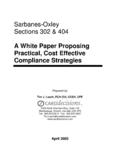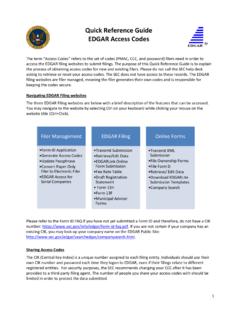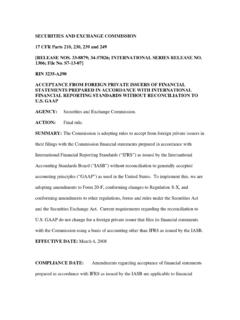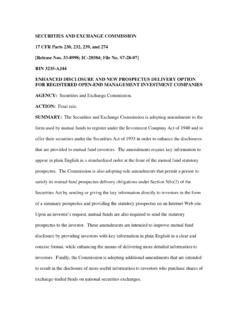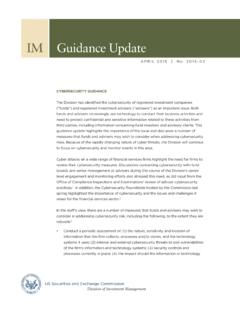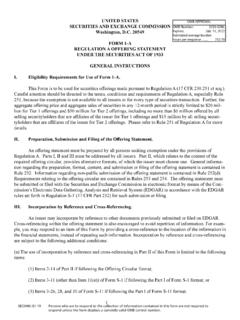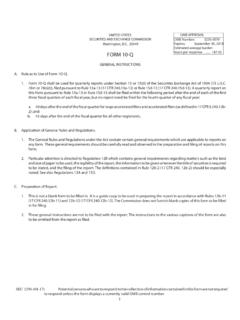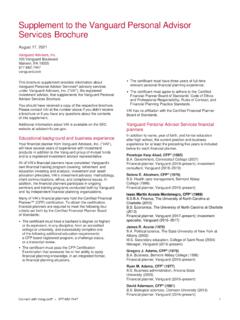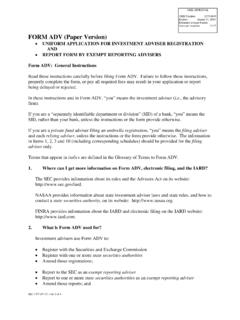Transcription of INVESTOR BULLETIN Hedge Funds - SEC
1 INVESTOR Assistance (800) 732-0330 BULLETIN Hedge FundsThe SEC s Office of INVESTOR Education and Advocacy is issuing this INVESTOR BULLETIN to educate individual investors about Hedge Funds . What are Hedge Funds ? Hedge Funds pool investors money and invest the money in an effort to make a positive return. Hedge Funds typically have more flexible investment strategies than, for example, mutual Funds . Many Hedge Funds seek to profit in all kinds of markets by using leverage (in other words, borrowing to increase investment exposure as well as risk), short-selling and other speculative investment practices that are not often used by mutual Funds .
2 You generally must be an accredited INVESTOR , which means having a minimum level of income or assets, to invest in Hedge Funds . Typical investors include institutional investors, such as pension Funds and insurance companies, and wealthy individuals. Hedge Funds are not subject to some of the regulations that are designed to protect investors. Depending on the amount of assets in the Hedge Funds advised by a manager, some Hedge fund managers may not be required to register or to file public reports with the SEC. Hedge Funds , however, are subject to the same prohibitions against fraud as are other market participants, and their managers owe a fiduciary duty to the Funds that they manage.
3 What information should I seek if I am considering investing in a Hedge fund ?n Read a fund s offering memorandum and related materials. The Hedge fund s offering documents and agreements contain important information about investing in the fund , including the investment strategies of the fund , whether the fund is based in the United States or abroad, the risks of the investment, fees earned by the Hedge fund manager, expenses charged to the Hedge fund and the Hedge fund manager s potential conflicts of interest. It is important that you read all the documents before making your decision to invest in a Hedge fund .
4 You should consider consulting an independent financial advisor before investing in a Hedge Understand the fund s investment strategy. There are a wide variety of Hedge Funds with many different investment strategies. Some Hedge Funds will be diversified among many strategies, managers INVESTOR Assistance (800) 732-0330 investments, while others may take highly concentrated positions or may only use a single strategy. Make sure you understand the level of risk involved in the fund s investment strategies and ensure that they are suitable to your personal investing goals, time horizons and risk tolerance.
5 As with any investment, generally the higher the potential returns, the higher the risks you must assume. n Determine if the fund is using leverage or other speculative investment techniques. Leverage is the use of borrowed money to make an investment. A Hedge fund using leverage will typically invest both the investors capital and the borrowed money to make investments in an effort to increase the potential returns of the fund . The use of leverage will magnify both the potential gain and the potential loss from an investment.
6 The use of leverage can turn an otherwise conservative investment into an extremely risky investment. A Hedge fund may also invest in derivatives (such as options and futures) and use short-selling (selling a security it does not own) to increase its potential returns, which could likewise increase the potential gain or loss from an investment. n Evaluate potential conflicts of interest disclosed by Hedge fund managers. For example, if your investment adviser recommends that you invest in a fund that the adviser manages, there may be a conflict of interest because your adviser may earn higher fees from your investments in the Hedge fund than the adviser might earn from other potential investments.
7 N Understand how a fund s assets are valued. Hedge Funds may invest in highly illiquid securities that may be difficult to value. Moreover, many Hedge Funds give themselves significant discretion in valuing illiquid securities. You should understand a fund s valuation process and know the extent to which a fund s securities are valued by independent sources. Valuations of fund assets will affect the fees that the manager Understand how a fund s performance is determined. Hedge Funds do not need to follow any standard methodology when calculating performance, and they may invest in securities that are relatively illiquid and difficult to value.
8 By contrast, federal securities laws dictate how mutual Funds can advertise their performance by requiring specific ways to calculate current yield, tax equivalent yield, average annual total return and after-tax return, as well as having detailed requirements for the types of disclosure that must accompany any performance data. If you are provided with performance data for the Hedge fund , ask whether it reflects cash or assets actually received by the fund as opposed to the manager s estimate of the change in value of fund assets and whether the data includes deductions for Understand any limitations on your right to redeem your shares.
9 Unlike mutual Funds where you can elect to sell your shares on any given day, Hedge Funds typically limit opportunities to redeem, or cash in, your shares ( , monthly, quarterly or annually), and often impose a lock-up period of one year or more, during which you cannot cash in your shares. In the time it takes for you to redeem your shares, their value could diminish and you will not have use of the money invested in those shares. Furthermore, Hedge Funds may charge you a redemption fee before you are allowed to cash in your shares.
10 Hedge Funds may also have authority to suspend redemptions under certain circumstances, including in times of market distress or when their investments are not able to be quickly or easily liquidated. INVESTOR Assistance (800) 732-0330 n Research the backgrounds of Hedge fund managers. Before entrusting your money to anyone, research their background and qualifications. Make sure Hedge fund managers are qualified to manage your money, and find out whether they have a disciplinary history within the securities industry. If the manager is registered with the SEC, you can get this information (and more) by reviewing the manager s Form ADV.


